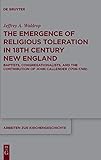The Emergence of Religious Toleration in Eighteenth-Century New England : Baptists, Congregationalists, and the Contribution of John Callender (1706-1748) / Jeffrey A. Waldrop.
Material type: TextSeries: Arbeiten zur Kirchengeschichte ; 138Publisher: Berlin ; Boston : De Gruyter, [2018]Copyright date: ©2018Description: 1 online resource (VII, 251 p.)Content type:
TextSeries: Arbeiten zur Kirchengeschichte ; 138Publisher: Berlin ; Boston : De Gruyter, [2018]Copyright date: ©2018Description: 1 online resource (VII, 251 p.)Content type: - 9783110586275
- 9783110586558
- 9783110588194
- 323.442 23
- Internet Access AEU
- online - DeGruyter
- Issued also in print.
| Item type | Current library | Call number | URL | Status | Notes | Barcode | |
|---|---|---|---|---|---|---|---|
 eBook
eBook
|
Biblioteca "Angelicum" Pont. Univ. S.Tommaso d'Aquino Nuvola online | online - DeGruyter (Browse shelf(Opens below)) | Online access | Not for loan (Accesso limitato) | Accesso per gli utenti autorizzati / Access for authorized users | (dgr)9783110588194 |
Frontmatter -- Contents -- Chapter 1: Introduction -- Chapter 2: Backgrounds of Puritanism in New England -- Chapter 3: Emergence of Religious Toleration in Puritan New England -- Chapter 4: The First Baptist Church of Boston and the Influence of the Callenders -- Chapter 5: Religious Toleration between Boston Congregationalists and Baptists -- Chapter 6: John Callender: Early Life and Ministr -- Chapter 7: John Callender: Later Life and Ministry -- Chapter 8: Callender’s Historical Discourse and Religious Toleration -- Chapter 9: Callender’s Historical Method and His Contribution to Isaac Backus -- Chapter 10: Conclusion -- Bibliography -- Index
restricted access online access with authorization star
http://purl.org/coar/access_right/c_16ec
This book examines the life and work of the Reverend John Callender (1706-1748) within the context of the emergence of religious toleration in New England in the later seventeenth and early eighteenth centuries, a relatively recent endeavor in light of the well-worn theme of persecution in colonial American religious history. New England Puritanism was the culmination of different shades of transatlantic puritan piety, and it was the Puritan’s pious adherence to the Covenant model that compelled them to punish dissenters such as Quakers and Baptists. Eventually, a number of factors contributed to the decline of persecution, and the subsequent emergence of toleration. For the Baptists, toleration was first realized in 1718, when Elisha Callender was ordained pastor of the First Baptist Church of Boston by Congregationalist Cotton Mather. John Callender, Elisha Callender’s nephew, benefited from Puritan and Baptist influences, and his life and work serves as one example of the nascent religious understanding between Baptists and Congregationalists during this specific period. Callender’s efforts are demonstrated through his pastoral ministry in Rhode Island and other parts of New England, through his relationships with notable Congregationalists, and through his writings. Callender’s publications contributed to the history of the colony of Rhode Island, and provided source material for the work of notable Baptist historian, Isaac Backus, in his own struggle for religious liberty a generation later.
Issued also in print.
Mode of access: Internet via World Wide Web.
In English.
Description based on online resource; title from PDF title page (publisher's Web site, viewed 28. Feb 2023)


